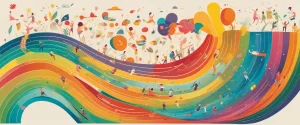
In the ever-evolving landscape of education, career development, and personal growth, the search for the most effective path to success is a perpetual pursuit. The intriguing question arises: should one specialize in a specific domain from an early age, or opt for a diverse range of experiences? David Epstein’s Range: Why Generalists Triumph in a Specialized World” and Nassim Nicholas Taleb’s “Antifragile: Things That Gain From Disorder” tackle this question head-on, each providing a unique perspective on the merits of specialization and the benefits of a broad-based, adaptable approach to life.
Epstein argues that conventional wisdom wrongly emphasizes the supremacy of specialization, asserting that those who dedicate themselves solely to one specific domain are bound to succeed. In contrast, Taleb challenges the notion of fragility and proposes the concept of antifragility, claiming that the ability to thrive and adapt in the face of uncertainty and disorder lies within embracing variability and randomness.
While both authors explore the significance of diverse experiences and the advantages of embracing uncertainty, they offer contrasting viewpoints on the role of specialization. Epstein contends that exposure to a wide array of fields and activities cultivates crucial skills of adaptability, creativity, and problem-solving abilities. Taleb, on the other hand, suggests that antifragility emerges from embracing volatility and capitalizing on errors, rather than attempting to fit within rigid specialization frameworks.
To delve deeper into this discussion, this comparative study aims to analyze and synthesize the key arguments made by Epstein and Taleb. By examining their respective works, we seek to explore the strengths and weaknesses of their approaches, providing readers with a comprehensive understanding of the benefits and potential drawbacks associated with specialization and range.
Moreover, this study will highlight the real-world implications of these theories, investigating their applicability in various sectors such as education, career development, and personal growth. Furthermore, we will assess the relevance of these theories in an ever-changing world that demands adaptability and resilience.
Through an in-depth examination of the ideas presented in “Range” and “Antifragile,” this comparative study aims to contribute to the ongoing dialogue surrounding specialization and its alternatives. By delving into the nuances and examining the practical implications of each author’s perspective, we hope to gain valuable insights that may guide individuals seeking to navigate the intricate web of personal and professional development.
In conclusion, the captivating ideas discussed in “Range” by David Epstein and “Antifragile” by Nassim Nicholas Taleb offer contrasting lenses through which to view the complex relationship between specialization and adaptability. By undertaking this comparative study, we strive to shed light on these perspectives, enabling readers to make informed decisions regarding their own pursuit of success and personal growth.
Brief Summary of Two Books
Range by David Epstein
“Range: Why Generalists Triumph in a Specialized World” by David Epstein explores the benefits of having a broad range of experiences and knowledge rather than specializing early on in one specific field. Epstein argues that contrary to popular belief, generalists have unique advantages in today’s complex and rapidly evolving world.
Epstein starts by challenging the notion that early specialization leads to success by presenting numerous examples of individuals who achieved greatness in their respective fields despite having diverse backgrounds or delays in finding their true passion. He emphasizes the importance of “sampling” different activities and industries before committing to a specific path, as this allows individuals to develop a wide range of skills and perspectives.
The book highlights the limitations of a solely specialized education, emphasizing how it can prevent individuals from adapting to new challenges or recognizing connections between seemingly unrelated fields. Epstein argues that problems in today’s world are often ill-defined and require the ability to think broadly and find innovative solutions, which generalists are more equipped to handle due to their diverse background.
Epstein also explores the concept of “match quality,” which suggests that the process of finding the right career or passion often involves trial and error and is influenced by factors beyond an individual’s control. This idea challenges the traditional notion of a linear path to success and encourages individuals to embrace uncertainty and exploration.
Throughout the book, Epstein incorporates compelling stories and research from various fields including sports, science, and business, to highlight the power of range. He argues that while specialization is still necessary in some fields, cultivating a broader skill set and being open to new experiences allows individuals to adapt and excel in an ever-changing world.
In conclusion, “Range” challenges the prevailing belief that specialization is the key to success and encourages individuals to embrace a more diverse and exploratory approach, arguing that range leads to a richer understanding of the world and increases the chances of finding true fulfillment and achievement.
Antifragile by Nassim Nicholas Taleb
“Antifragile” by Nassim Nicholas Taleb is a philosophical and thought-provoking exploration of how systems, be it individuals, organizations, or societies, can not only survive but thrive amidst uncertainty, chaos, and volatility.
The book introduces the concept of antifragility, which goes beyond the traditional notions of mere resilience or robustness. Antifragile entities not only withstand shocks and disruptions, but they actually benefit from them, gaining strength, agility, and adaptability in the process.
Taleb argues that the modern world tends to overly focus on reducing risk and avoiding negative events, which ultimately makes systems more fragile and vulnerable. He believes that instead of trying to control or predict every possible outcome, we should embrace randomness and embrace the idea of tinkering, experimentation, and decentralization. By doing so, we can create systems that become more antifragile, able to benefit from uncertainty and randomness.
The book covers various domains, including economics, politics, health, and personal life, to demonstrate the principles of antifragility. Taleb explains the ideas through anecdotes, historical events, and philosophical musings, challenging commonly held beliefs and advocating for a more adaptive and less top-down approach to living.
Overall, “Antifragile” offers a new perspective on how to navigate a complex and uncertain world, urging readers to embrace uncertainty, learn from failures, and foster systems that can thrive in the face of adversity.
Comparison between Two Books

Similarities in Self Help
Both “Range” by David Epstein and “Antifragile” by Nassim Nicholas Taleb offer self-help insights to individuals seeking personal growth and success. While their approaches may differ, similarities can be drawn in terms of their focus on cultivating adaptability, embracing uncertainty, and avoiding excessive specialization.
1. Cultivating adaptability: Both books emphasize the importance of developing a broad range of skills and knowledge rather than solely specializing in a single area. Epstein advocates for the benefits of “range” – diverse experiences, interests, and skills – which allow individuals to think creatively and solve problems from different perspectives. Taleb promotes a similar idea in “Antifragile”, arguing that being adaptable and open to learning from different disciplines can help individuals thrive in uncertain and changing environments.
2. Embracing uncertainty: Both authors argue against seeking absolute certainty and instead encourage readers to embrace and navigate uncertainty effectively. Epstein suggests that individuals who have experiences in different domains are better equipped to handle ambiguous situations, as they have a broader base of knowledge and can draw connections between seemingly unrelated fields. Taleb, on the other hand, promotes the concept of “antifragility”, which suggests that individuals and systems should not merely aim to be resilient (i.e., withstand shocks), but to thrive and grow from uncertainty and volatility.
3. Avoiding excessive specialization: Epstein and Taleb caution against excessive specialization and the dangers of being too narrowly focused. Epstein argues that those who pursue a specialized path from an early age may miss out on the benefits of a broader range of experiences and may become too inflexible to adapt to changing circumstances. Taleb defines “fragility” as being overly specialized and vulnerable to shocks when circumstances change. He advocates for building resilience by diversifying interests and skills to mitigate risks.
In summary, both “Range” by David Epstein and “Antifragile” by Nassim Nicholas Taleb offer similar self-help insights by encouraging individuals to cultivate adaptability, embrace uncertainty, and avoid excessive specialization. By following these principles, readers can enhance their personal growth, adapt to changing environments, and thrive amidst uncertainty.
Divergences in Self Help
Range by David Epstein and Antifragile by Nassim Nicholas Taleb are both non-fiction books that explore the concept of success and personal growth, but they approach the topic from different angles. While both books provide valuable insights, they diverge in their perspectives on self-help.
In Range, David Epstein challenges the notion that early specialization and narrow expertise are the keys to success. He argues that individuals with a broad range of knowledge, experiences, and interests are often better equipped to navigate complex and unpredictable environments. Epstein emphasizes the importance of generalists over specialists, citing examples of successful individuals who thrived due to their diverse skillsets and adaptability. Although Range offers practical advice on how to cultivate a broader range of skills, it does not extensively delve into the realm of traditional self-help techniques or mindset strategies.
On the other hand, Antifragile by Nassim Nicholas Taleb explores the concept of resilience and adaptability by delving into the idea of being “antifragile.” Taleb argues that instead of merely aiming to be resilient or robust, individuals should strive to become antifragile, i.e., to gain from uncertainty and chaotic events. While not classified as a self-help book, Antifragile provides philosophical principles and frameworks that encourage readers to approach life with a certain mindset. Taleb challenges conventional wisdom and encourages readers to embrace uncertainty, take risks, and learn from failures, all of which can be seen as self-help concepts aimed at personal growth and well-being.
The divergence in self-help lies mainly in the focus and approach of the two books. Range puts more emphasis on the acquisition of diverse skills and experiences, broadening horizons, and overcoming obstacles through adaptability and flexibility, whereas Antifragile concentrates more on adopting a mindset and philosophy that enables individuals to thrive under uncertain and challenging circumstances.
In conclusion, while both Range and Antifragile offer valuable insights into personal growth and success, their approaches to self-help differ. Range advocates for cultivating a broad range of skills and experiences, while Antifragile promotes a mindset that embraces uncertainty and chaos. Both books contribute to the broader conversation on personal development, but readers seeking specific self-help techniques may find Range more relevant, while those interested in adopting a philosophical framework for personal growth may be drawn to Antifragile.

Conclusion
Both Range by David Epstein and Antifragile by Nassim Nicholas Taleb are highly regarded books that offer different perspectives on success and adaptability.
Range focuses on the idea that generalists, rather than specialists, are more likely to succeed in a rapidly changing and complex world. Epstein presents compelling evidence from various fields to support his argument, emphasizing the importance of acquiring diverse knowledge and experiences.
Antifragile, on the other hand, explores the concept of antifragility and how systems can benefit from shocks and uncertainty. Taleb argues that embracing volatility and randomness can lead to adaptation and growth, making the system stronger over time.
Ultimately, the book that is more worthy of reading depends on your personal interests and the specific ideas and concepts that resonate with you. If you are interested in the benefits of being a generalist and the value of broadening your skill set, Range may be the better choice. However, if you are intrigued by the idea of thriving in unpredictable and chaotic environments, and the concept of antifragility resonates with you, then Antifragile may be more appealing.
Both books have received positive reviews and have made significant contributions to their respective fields, so either choice would likely provide valuable insights and perspectives.



